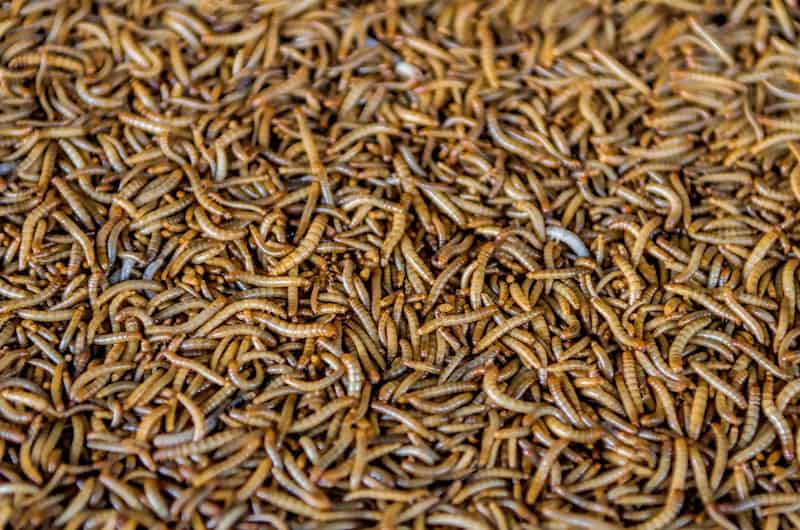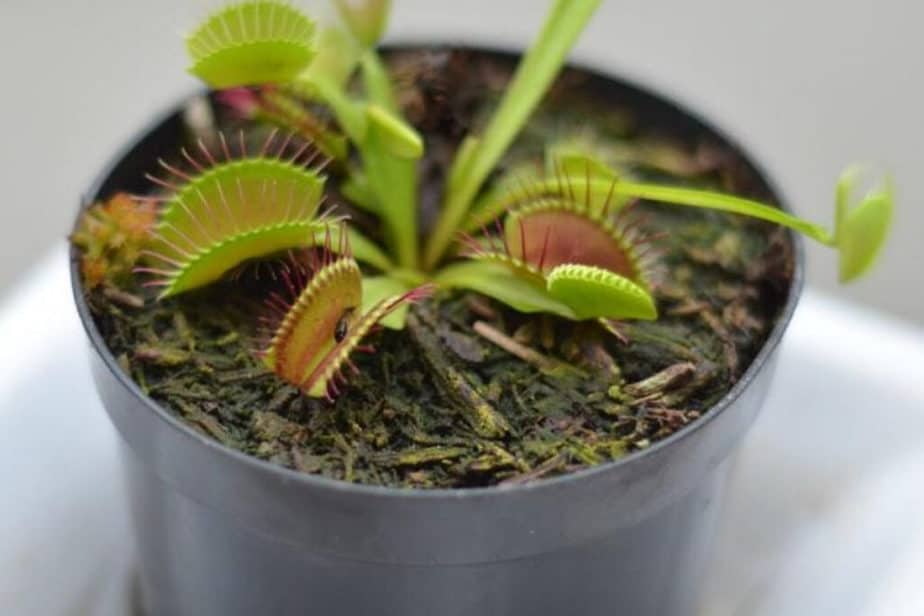Venus flytraps are carnivorous plants that trap insects with sticky hairs and then inject digestive enzymes into the insect to break it down into nutrients for healthy growth.
Venus flytraps can eat many kinds of small insects and bugs.
If you’ve been wondering, can Venus Fly Traps eat mealworms, this article will cover all about mealworms as plant food.
- Related article: What Do Venus Flytraps Eat?
Can Venus Flytraps Eat Mealworms?
Mealworms can be a great, nutritious meal for Venus flytraps. They are naturally found in nature and are easy to obtain at any good pet store or online. They offer the Venus flytrap plant a healthy diet of protein and other nutrients.
Venus flytrap plants require insects and their nutrients to survive. Mealworms are just one food source to make sure they get what they need.
Mealworms are a great snack for your Venus flytrap, but it’s important that you ask yourself whether you need to feed your plant mealworms. The answer to that question is probably not.
Mealworms are not a necessity, especially when growing Venus flytraps outdoors. They will probably get enough insects just by being outside.
Can you feed Venus fly traps mealworms so they don’t go hungry? If you’re growing the Venus flytraps indoors, you can feed them mealworms because they probably won’t catch many insects naturally like they would outdoors.

Are Mealworms the Only Food for Venus Flytraps?
Besides mealworms, Venus flytraps plants will eat many types of insects such as beetles, blood worms, crickets, grasshoppers, caterpillars, etc.
They’ll eat the majority of small bugs as long as they can fit inside its trap and the trap can completely close itself around the food. The Venus flytrap and other carnivorous plants do not eat meat or other human food.
Other indoor houseplants will typically use soil and fertilizer full of nutrients to help them grow and thrive. But Venus flytraps are native to the bogs of North and South Carolina, where the soil has absolutely no nutrients. These plants will get their nutrients from the insects they catch.
Indoor Venus flytraps will need help to get the nutrients to survive, but since they are more sensitive to fertilizer, feeding them insects and mealworms is needed.
- Related article: Venus Fly Trap Sizes
How to Feed Mealworms to the Venus Flytrap
Mealworms are easy to feed to the Venus flytrap. Follow these steps:
- Make sure the mealworm is no bigger than 1/3 the size of the trap. Anything bigger can potentially cause the trap not to completely close and the mealworm not being fully digested. That can lead to plant death.
- Use tweezers to grab the mealworm and place it in the center of the trap. Place it so that the trigger hairs will get stimulated and the trap will close over the mealworm.
- Continue to stimulate the trap leaves, so the trap will continue to release digestive enzymes to break down the mealworm. It helps trick the trap to think that the mealworm is still wriggling. Otherwise, the trap will open up and lose its food.
That’s all there is to it!
You’ll only need to feed each trap every 2-4 weeks because it’ll take 1-2 weeks for the trap to fully digest its food.
It’s also important not to feed all the traps at the same time. That can lead to overfeeding the Venus flytrap. That can lead to the plant eventually dying.
Because the Venus flytrap is a perennial plant, it also needs to rest during the winter months. If you keep trying to feed it throughout the year, then it won’t be able to rest.
Freeze Dried or Live Mealworms – Which is Better?
Can Venus fly traps eat dried mealworms or are live ones better?
Both freeze-dried and live mealworms will provide nutrients to Venus flytraps, but live mealworms will be fresher.
One disadvantage of live mealworms is the possibility that the mealworm may escape from the trap. To solve that issue, you can cut the head off the mealworm before putting it in the trap.
An advantage of the freeze-dried mealworms is that they will last longer and they’re easier to handle. You don’t need to be as worried about when to feed your Venus fly trap mealworms.
You can get mealworms at most pet shops and online stores.
Tips for Using Freeze Dried Mealworms
Freeze dried meal worms are great for feeding Venus flytraps because they’re easy to handle and still provide plenty of nutrients to the plant. Since these are dead mealworms, you’ll need to manually stimulate the plant’s trigger hairs to start the digestion process.
Here are some tips for using and feeding Venus flytraps with freeze-dried mealworms:
- Rehydrate them with a few drops of water before you feed them to your plant.
- Cut the mealworm to 1/3 the length of the trap.
- Use tweezers to place the mealworm inside the trap and then trigger the hairs with tweezers to close the trap.
- Feeding one trap a week should be more than enough to keep the Venus flytrap healthy, because nutrients are shared across the plant.
What Plants Are Mealworms Good Food For?
Mealworms are good food for any type of carnivorous plant. You should feed them to smaller carnivorous plants such Venus Flytrap or pitcher plants.
Venus flytraps love to eat mealworms. They’re especially useful for indoor Venus flytrap plants. Because they don’t require much light, they thrive indoors.
They’re also very easy to care for. Just give them plenty of sunlight and water once a week.
Pitcher plants are larger and can eat more than other plants. They can eat crickets too. You should try different foods until you find what works well for your pitcher plant. Once you do, you’ll be proud to show off your beautiful pitcher plant.

Winter Dormancy and Mealworms
Can you feed a Venus fly trap mealworms in the winter? Will they eat at all? Unfortunately, not.
Venus flytraps and other carnivorous plants go into dormancy during winter. You should be careful about feeding them during this period.
If you do feed them, then you might want to reduce their amount by half. Plants aren’t growing during the winter dormancy period, so there’s no need to feed them.
When you feed them, you could end up killing them. If you feed them too often, then you might kill them.
Venus Flytrap and Mealworms Final Thoughts
Mealworms are an excellent nutritious food source for Venus flytraps and carnivorous plants. They carry plenty of nutrients to grow healthy plants.
Here are other articles that you might be interested in:




